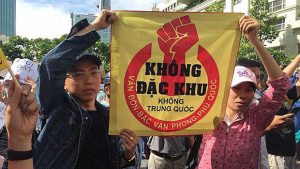There’s a satirical cartoon going around social media in Vietnam. “I’m in prison for killing two people,” says one of two men in a jail cell. “What are you in for?” he asks the other. The second man replies: “I liked two Facebook posts.” As with any political joke, this one has the right mixture of pathos and urgency. It’s a conversation, one feels, that could actually be take place after two recent incidents in Vietnam.
In the first development, the ruling Communist Party passed its new cybersecurity law last week, which many think will severely restrict free speech online, one of the few places where the Vietnamese could speak openly. Given what has happened in other Southeast Asian nations that have passed similar laws, we could see dozens, if not hundreds, of Vietnamese now thrown in jail for “liking two Facebook posts.” This is all the more probable given Hanoi’s proclivity for imprisoning its citizens.
In the second development, after nationwide protests broke out across Vietnam on June 10 against new special economic zones, which many think will benefit China, over one hundred people have now been arrested with many more expected to be detained in the coming weeks. Eight people were arrested on Saturday alone for taking part in the previous weekend’s protests.
Among those detained on June 10 was William Nguyen, an American national visiting Vietnam when he joined the protests. Videos spread on social media show him being beaten by plainclothes police auxiliaries, or hired thugs, before being hurled into a police van with an orange bag over his head. Days passed before he was allowed to see U.S. embassy officials, or reportedly to receive medical attention for his wounds. It’s unclear as to whether he will be charged or released.
All in all, William Nguyen’s arrest shouldn’t be any more important or any less tragic than the arrest of the dozens of Vietnamese also detained for simply protesting. But, that said, it is. His detention has become an international issue. Major international newspapers have reported on his arrest, with commentary on the nationwide protests only included as context. Meanwhile a number of American lawmakers have promised to campaign on his behalf, writing in one joint statement last week that their “next step will be to contact President Trump and Secretary of State Mike Pompeo to express the need for immediate action at the highest levels to achieve William’s release.”
The Vietnamese authorities could presumably have just released him and kicked him out of the country, which probably wouldn’t have created as much of an international incident. Instead, the government has arrested him and launched investigations into him “causing public disorder.” Moreover, on June 18 the authorities paraded him on state-television where he made an apology, likely under duress, for breaking the law.
This form of treatment has been seen in some other high-profile cases as well. Just last year, the country’s security forces abducted a Vietnamese national in broad daylight from a park in Berlin. The German government, naturally, reacted angrily by expelling some diplomats before demanding the return of Trinh Xuan Thanh. But, days later, the Vietnamese government added further insult by parading him on national television where, by most accounts, he was forced into making a prepared confession, saying he voluntarily returned to the country. He was later jailed for life on corruption charges.
In both these instances, the Vietnamese government is engaging in acts and treatment that rile up officials in Germany and the United States, both of which are important partners for Vietnam. For instance, if the Vietnamese Communist Party (VCP) wants to boost ties Europe, it needs Germany’s support as measures such as the EU-Vietnam Free Trade Agreement take off. The boldness of the Vietnamese government in this approach may be due to a range of reasons, from the fact that it perceives it needs to crack down more harshly on dissent at home or the belief that Hanoi has more leverage on its partners abroad given its rising strategic importance.
In fairness, there does at least appear to be some calibration involved beyond some of these individual cases. With Germany for instance, Hanoi has also tried currying favor with Berlin in recent weeks. In May, Hanoi imprisoned six leading human rights activists, including rights lawyer Nguyen Van Dai. But just two months later, it announced that it will release him so that he, and another imprisoned member of the Brotherhood for Democracy group, can go into exile in Germany.
There may also be reasons why certain cases are treated differently than others. David Brown, a commentator on Vietnam, this week opined that William Nguyen might have been arrested because of a long essay he recently published, which presented a “heretical” view of the Vietnam War.
Nonetheless, these incidents demonstrate a trend where the Vietnamese government’s growing role on issues that external actors care about, such as the South China Sea, is coexisting with rising repression internally that is to the detriment of the Vietnamese people. And judging from what we have seen recently, this trend does not seem to be going away anytime soon.

































